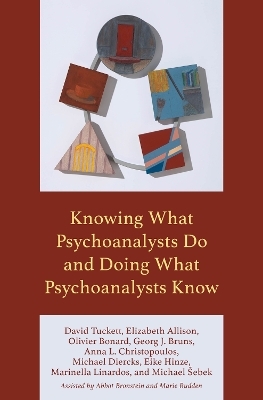
Knowing What Psychoanalysts Do and Doing What Psychoanalysts Know
Rowman & Littlefield (Verlag)
978-1-5381-8809-5 (ISBN)
The authors have collaborated with over a thousand colleagues worldwide to collect a unique dataset of everyday clinical sessions using a new workshop discussion method designed to reveal differences. Faced with diversity but wanting to surface and understand it, not suppress it, they had to evolve a new theoretical framework. It covers different approaches to the analytic situation (using the metaphors, cinema, dramatic monologue, theatre and immersive theatre); different sources of data to use to infer unconscious content, differences in the troubles patients unconsciously experience and how to approach them and differences in when, about what and how a psychoanalyst should talk.
Eventually taking the form of 11 very practical questions for psychoanalysts to ask of each session they conduct, the framework tries to help experienced psychoanalysts and students alike to choose what they want to try to do and to assess for themselves how far they are doing it. A final chapter applies the new framework and eleven practical questions to some contemporary technical controversies with some surprising results.
About the Author David Tuckett is a Distinguished Fellow and Training and Supervising Analyst at the British Psychoanalytic Society and Emeritus Professor of Decision-Making at University College London (UCL). He is a practicing psychoanalyst as well as Fellow of the Royal Society of Arts and was the founding editor of the New Library of Psychoanalysis. He has served as Editor in Chief of the International Journal of Psychoanalysis, President of the European Psychoanalytic Federation, Board member of the International Psychoanalytic Association and Chair of the Comparative Clinical Methods working party. He has contributed books and journal articles in the fields of medical sociology, economics and cognitive science and developed and published articles in leading journals on Conviction Narrative Theory – a theory of choice under uncertainty, which combines psychoanalytic, neuroscientific, sociological, and economic insights to understand decision making under uncertainty and its wider effects on society, such as in the creation of financial crises. He gave a TED lecture at the University of Warwick and spoke at significant policy-making events such as the Davos Forum as well as publishing on monetary and financial stability policy in the staff working papers series of the Bank of England. He has twice received the Sigourney Award for contributions to psychoanalysis. Contributors Elizabeth Allison, Olivier Bonard, Abbot Bronstein, Georg J. Bruns, Anna L. Christopoulos, Michael Diercks, Eike Hinze, Marinella Linardos, Marie Rudden, Michael Šebek
Acknowledgments
Preface
Chapter 1: Towards a Shared Framework for Self-Enquiry
Chapter 2: Our Method and Our Data
Chapter 3: The Analytic Situation
Chapter 4: How do we Recognise what is Unconscious?
Chapter 5: From what Unconscious Repetitions do Patients Suffer?
Chapter 6: How do we Further the Process?
Chapter 7: Nodal Interventions and Creative Change
Chapter 8: Bringing it Together: Some Questions
Chapter 9: Core Issues for Psychoanalysts Emerging from this Work
Glossary
References
Index of Cases Discussed
Index
About the Authors
| Erscheinungsdatum | 17.01.2024 |
|---|---|
| Verlagsort | Lanham, MD |
| Sprache | englisch |
| Maße | 183 x 262 mm |
| Gewicht | 821 g |
| Themenwelt | Geisteswissenschaften ► Psychologie ► Psychoanalyse / Tiefenpsychologie |
| ISBN-10 | 1-5381-8809-0 / 1538188090 |
| ISBN-13 | 978-1-5381-8809-5 / 9781538188095 |
| Zustand | Neuware |
| Haben Sie eine Frage zum Produkt? |
aus dem Bereich


